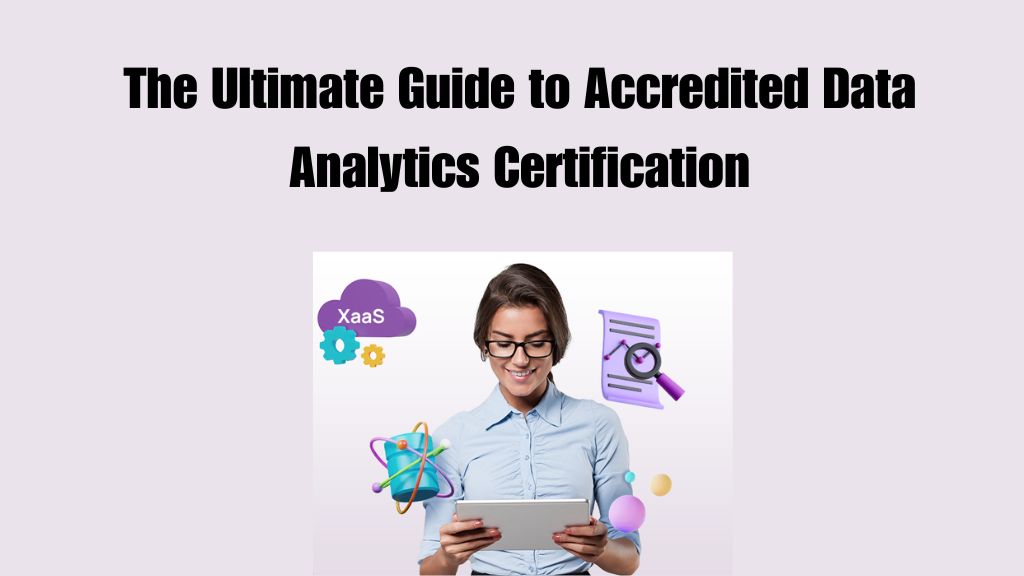We will know The Ultimate Guide to Accredited Data Analytics Certification the ability to analyze and interpret data has become an invaluable skill across various industries. As businesses and organizations increasingly rely on data to make informed decisions, the demand for professionals with data analytics expertise continues to grow. One way to demonstrate your proficiency and stand out in the competitive job market is by earning an accredited data analytics certification. This comprehensive guide will explore the ins and outs of data analytics certification, why it’s important, the types available, and how to choose the right one for your career goals.
Table of Contents
- Introduction to Data Analytics
- What is Data Analytics?
- Importance of Data Analytics in Modern Business
- Why Pursue a Data Analytics Certification?
- Benefits of Certification
- Career Opportunities
- Salary Potential
- Types of Data Analytics Certifications
- Entry-Level Certifications
- Intermediate-Level Certifications
- Advanced-Level Certifications
- Top Accredited Data Analytics Certification Programs
- Coursera and IBM Data Analyst Professional Certificate
- Microsoft Certified: Data Analyst Associate
- Google Data Analytics Professional Certificate
- Certified Analytics Professional (CAP)
- SAS Certified Data Scientist
- Choosing the Right Certification for You
- Assessing Your Current Skill Level
- Considering Your Career Goals
- Understanding the Certification Requirements
- Preparing for a Data Analytics Certification Exam
- Study Resources
- Practical Experience
- Time Management Tips
- Maintaining and Renewing Your Certification
- Continuing Education
- Recertification Processes
- Conclusion
- The Value of Accredited Data Analytics Certification in Your Career
- Final Thoughts and Next Steps
1. Introduction to Data Analytics
What is Data Analytics?
Data analytics is the process of examining large datasets to uncover patterns, trends, and insights that can inform decision-making. This involves collecting, cleaning, The Ultimate Guide to Accredited Data Analytics Certification and analyzing data using statistical methods and software tools. Data analytics can be divided into four main types:
- Descriptive Analytics: This type focuses on summarizing historical data to understand what has happened. Common techniques include data aggregation and data mining.
- Diagnostic Analytics: This type aims to determine why something happened by examining data more deeply. It involves techniques like drill-down, data discovery, and correlations.
- Predictive Analytics: This type uses historical data to predict future outcomes. Techniques include machine learning, statistical modeling, and forecasting.
- Prescriptive Analytics: This type provides recommendations for actions to achieve desired outcomes. It involves optimization, simulation, and decision analysis.
Importance of Data Analytics in Modern Business
In the modern business landscape, data analytics plays a crucial role in driving decision-making and strategy development. By leveraging data analytics, The Ultimate Guide to Accredited Data Analytics Certification organizations can:
- Improve Operational Efficiency: Identify bottlenecks and inefficiencies in processes to streamline operations and reduce costs.
- Enhance Customer Experience: Analyze customer behavior and preferences to tailor products and services to meet their needs.
- Boost Marketing Effectiveness: Measure the performance of marketing campaigns and optimize strategies to increase ROI.
- Inform Strategic Decisions: Provide insights that guide long-term planning and investment decisions.
2. Why Pursue a Data Analytics Certification?
Benefits of Certification
Earning an accredited data analytics certification offers several benefits:
- Validation of Skills: Certifications provide a formal recognition of your expertise and knowledge in data analytics.
- Competitive Edge: Having a certification sets you apart from other candidates in the job market, showcasing your commitment to professional development.
- Networking Opportunities: Certification programs often provide access to professional communities and networking events.
- Increased Confidence: The rigorous preparation for certification exams boosts your confidence in your abilities.
Career Opportunities
With a data analytics certification, you can pursue a variety of career paths, including:
- Data Analyst: Collect, process, and perform statistical analyses on large datasets.
- Business Analyst: Use data analytics to improve business processes and strategies.
- Data Scientist: Develop advanced analytical models and algorithms to solve complex problems.
- Data Engineer: Design, construct, and maintain data systems and pipelines.
- Machine Learning Engineer: Create and deploy machine learning models to automate tasks and make predictions.
Salary Potential
The salary potential for data analytics professionals is highly attractive. According to the U.S. Bureau of Labor Statistics, the median annual wage for data analysts is around $76,000, The Ultimate Guide to Accredited Data Analytics Certification with top earners making over $100,000. Data scientists and machine learning engineers can command even higher salaries, often exceeding $120,000 annually.
3. Types of Data Analytics Certifications
Entry-Level Certifications
Entry-level certifications are ideal for individuals who are new to data analytics and want to build foundational skills. These certifications typically cover basic concepts,The Ultimate Guide to Accredited Data Analytics Certification tools, and techniques. Examples include:
- Google Data Analytics Professional Certificate: Offered through Coursera, this certification covers data cleaning, analysis, and visualization using tools like SQL, R, and Tableau.
- IBM Data Analyst Professional Certificate: Also available on Coursera, this program focuses on data analysis using Python, Excel, and SQL.
Intermediate-Level Certifications
Intermediate-level certifications are designed for professionals with some experience in data analytics who want to deepen their knowledge and skills. The Ultimate Guide to Accredited Data Analytics Certification Examples include:
- Microsoft Certified: Data Analyst Associate: This certification focuses on using Microsoft Power BI to analyze and visualize data.
- SAS Certified Specialist: Base Programming Using SAS 9.4: This certification demonstrates proficiency in data manipulation and analysis using SAS software.
Advanced-Level Certifications
Advanced-level certifications are intended for experienced data professionals seeking to specialize in advanced techniques and leadership roles. Examples include:
- Certified Analytics Professional (CAP): This certification, offered by the Institute for Operations Research and the Management Sciences (INFORMS), validates expertise in the entire analytics process, from problem framing to model deployment.
- SAS Certified Data Scientist: This advanced certification covers a range of topics, including machine learning, data mining, and big data technologies.
4. Top Accredited Data Analytics Certification Programs
Coursera and IBM Data Analyst Professional Certificate
The IBM Data Analyst Professional Certificate is an excellent choice for beginners. It consists of nine courses that cover various aspects of data analysis, including data visualization,The Ultimate Guide to Accredited Data Analytics Certification Python programming, and SQL. The program is self-paced and can be completed in approximately six months.
Microsoft Certified: Data Analyst Associate
The Microsoft Certified: Data Analyst Associate certification focuses on using Microsoft Power BI to analyze and visualize data. Candidates must pass the DA-100 exam, which tests their ability to prepare, model, and visualize data, as well as deploy and maintain deliverables.
Google Data Analytics Professional Certificate
The Google Data Analytics Professional Certificate is designed for individuals seeking entry-level roles in data analytics. The program consists of eight courses covering data cleaning, analysis,The Ultimate Guide to Accredited Data Analytics Certification and visualization using tools like SQL, R, and Tableau. It can be completed in about six months.
Certified Analytics Professional (CAP)
The CAP certification, offered by INFORMS, is a prestigious credential for advanced analytics professionals. It covers the entire analytics process,The Ultimate Guide to Accredited Data Analytics Certification from defining business problems to deploying models. To earn the CAP certification, candidates must pass a rigorous exam and demonstrate significant experience in the field.
SAS Certified Data Scientist
The SAS Certified Data Scientist credential is an advanced certification that validates expertise in using SAS software for data manipulation, machine learning, and big data analysis.The Ultimate Guide to Accredited Data Analytics Certification Candidates must pass multiple exams covering a range of topics, including data management, advanced analytics, and programming.
5. Choosing the Right Certification for You
Assessing Your Current Skill Level
Before choosing a certification, it’s essential to assess your current skill level. Consider your experience with data analysis tools and techniques, as well as your familiarity with programming languages like Python, R, and SQL. Entry-level certifications are ideal for beginners, The Ultimate Guide to Accredited Data Analytics Certification while intermediate and advanced certifications are better suited for those with more experience.
Considering Your Career Goals
Your career goals should also guide your certification choice. If you’re aiming for an entry-level data analyst position, a foundational certification like the Google Data Analytics Professional Certificate is a good starting point. For more advanced roles, such as data scientist or machine learning engineer, an advanced certification like the CAP or SAS Certified Data Scientist may be more appropriate.
Understanding the Certification Requirements
Each certification has specific requirements, including prerequisite knowledge, exam formats, and continuing education obligations. Be sure to review these requirements carefully to ensure you can meet them. Some certifications may also require you to complete certain courses or training programs before you can take the exam.
6. Preparing for a Data Analytics Certification Exam
Study Resources
There are numerous study resources available to help you prepare for your certification exam. These include:
- Online Courses: Platforms like Coursera, edX, and Udacity offer courses specifically designed to prepare you for certification exams.
- Books: There are many books available on data analytics, covering both theoretical concepts and practical applications.
- Practice Exams: Taking practice exams can help you familiarize yourself with the format and types of questions you’ll encounter on the actual exam.
Practical Experience
Gaining practical experience is crucial for passing a data analytics certification exam. Consider working on real-world projects, either through your job or by participating in The Ultimate Guide to Accredited Data Analytics Certification online competitions and hackathons. Practical experience will help you apply theoretical knowledge to real-world scenarios and improve your problem-solving skills.
Time Management Tips
Effective time management is essential for successful exam preparation. Create a study schedule that allows you to cover all the necessary material without feeling overwhelmed. Break down your study sessions into manageable chunks and set specific goals for each session.
7. Maintaining and Renewing Your Certification
Continuing Education
Many certifications require you to complete continuing education activities to maintain your credential. These activities can include attending workshops, taking additional courses, or participating in professional development programs. The Ultimate Guide to Accredited Data Analytics Certification Staying up-to-date with the latest advancements in data analytics will help you remain competitive in the field.
Recertification Processes
Some certifications have specific recertification processes that you must follow to keep your credential active. This may involve passing a recertification exam or The Ultimate Guide to Accredited Data Analytics Certification submitting proof of continuing education activities. Be sure to review the recertification requirements for your certification and plan accordingly.
The Value of Accredited Data Analytics Certification in Your Career
An accredited data analytics certification is a valuable asset that can significantly enhance your career prospects. It demonstrates your expertise and commitment to professional development,The Ultimate Guide to Accredited Data Analytics Certification giving you a competitive edge in the job market. Whether you’re just starting in the field or looking to advance to higher-level roles, earning a certification can open up new opportunities and increase your earning potential.
Final Thoughts and Next Steps
The Ultimate Guide to Accredited Data Analytics Certification Now that you have a comprehensive understanding of accredited data analytics certifications, it’s time to take the next steps. Assess your current skill level, set clear career goals, and choose the certification that best aligns with your aspirations. Prepare thoroughly for your certification exam, and don’t forget to plan for maintaining and renewing your credential. With dedication and hard work, you can achieve your certification and unlock a world of possibilities in the exciting field of data analytics.

